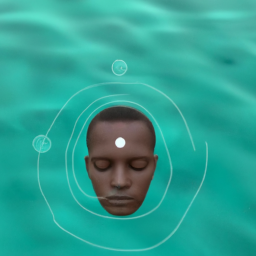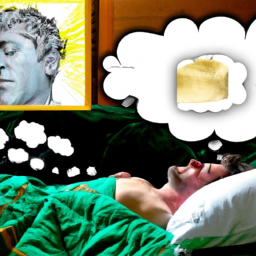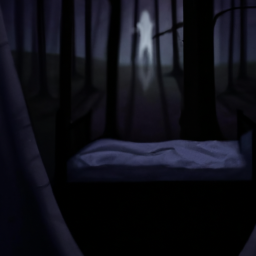Dreams and their meanings have always fascinated me. As a child, I often found myself waking up in the middle of the night, heart racing, after a scary dream. Over time, I’ve come to understand that dreams can provide insight into our deepest fears, desires, and emotions, serving as a window to our subconscious minds.
One common dream that many people experience is the sensation of dying. But what does it mean when we dream of our own death?
In this article, we will explore the different interpretations and explanations for the experience of dying in a dream. From psychological interpretations to cultural and spiritual beliefs, we will examine the various ways in which people have tried to decode this mysterious phenomenon.
Whether you’re someone who frequently has nightmares or simply curious about the inner workings of the human mind, this article will provide insight into the significance of dying in your dreams.
Key Takeaways
- Dreaming about death can represent the end of a phase or transformation, a fear of change, a release from anxiety or stress, or a desire for control over one’s life.
- Cultural and spiritual interpretations of death in dreams reveal how different societies view the end of life in the dream world, such as dreaming of death symbolizing a new beginning in ancient Egyptian culture.
- Coping mechanisms for processing emotions after dreaming about dying include journaling and talking to a trusted friend or therapist.
- Nightmares and night terrors can cause anxiety and fear, but coping mechanisms such as relaxation techniques, cognitive behavioral therapy, and dream journaling can help manage them.
Overview of Dreams and Their Meanings
You’ve probably had a dream before, and you know that they often have hidden meanings that can reveal a lot about your subconscious thoughts and emotions. Interpreting symbolism and analyzing dream patterns are two common techniques used to decipher what your dreams may be trying to tell you.
Dreams can range from being straightforward and reflective of your daily experiences to being complex and symbolic, requiring a deeper analysis to understand their significance. Symbolism in dreams can be interpreted in a variety of ways, depending on the individual’s personal experiences and cultural background.
For example, dreaming about falling may represent a feeling of loss of control or instability in your waking life. Analyzing dream patterns, such as recurring themes or symbols, can also provide insight into your subconscious thoughts and emotions. Understanding the meaning behind your dreams can help you to better understand yourself and your actions in your waking life.
Now, let’s delve into the different types of dreams.
Different Types of Dreams
I find it fascinating to explore the different types of dreams that we experience.
Lucid dreams, where we are aware that we’re dreaming and can control the dream, can be a thrilling experience.
Nightmares, on the other hand, can be terrifying and leave us feeling anxious even after we wake up.
Recurring dreams, which are dreams that we have repeatedly, can hold significant meaning and provide insight into our subconscious thoughts and emotions.
Lucid Dreams
If you’re lucky enough to experience a lucid dream, you’ll feel like a boss, able to control the dream world like a video game character. Lucid dreaming is a state in which the dreamer is aware they’re dreaming and can actively participate in the dream.
There are a variety of techniques to induce lucid dreams, such as reality checks, keeping a dream journal, and meditating before sleep. The benefits of lucid dreaming extend beyond just the thrill of controlling your own dreams. It can also be a useful tool for overcoming nightmares, facing fears, and problem-solving.
It allows you to confront and work through your subconscious in a safe and controlled environment. However, it’s important to remember that lucid dreaming isn’t a substitute for therapy or professional help.
As we move into the next section about nightmares, it’s important to note that even lucid dreams can turn into nightmares if not properly managed. In these cases, it’s helpful to have strategies in place for waking yourself up or changing the dream scenario.
Nightmares
Nightmares can be a terrifying experience, causing anxiety and fear that can linger long after waking up. Coping mechanisms for nightmares include practicing relaxation techniques, such as deep breathing or meditation, before going to bed.
It’s also helpful to create a calming environment in your bedroom, such as dimming the lights or playing soothing music. Additionally, it can be beneficial to talk to a therapist or counselor about your nightmares and any underlying psychological issues that may be causing them.
The impact of nightmares on mental health can be severe, leading to symptoms of anxiety and depression. It can also cause sleep disturbances and lead to a decrease in overall quality of life. However, with proper coping mechanisms and treatment, individuals can learn to manage their nightmares and improve their mental health.
Recurring dreams, on the other hand, can be a different experience altogether.
Recurring Dreams
Recurring dreams can be a perplexing phenomenon, leaving individuals wondering why they keep experiencing the same dream over and over again. Some people may have recurring dreams of being chased, falling, or even flying.
These dreams can be frustrating and leave individuals feeling uneasy, but they can also be an opportunity to gain insight into one’s subconscious mind. Interpretation methods can help individuals understand the significance of their recurring dreams.
For example, the dream of falling may represent a loss of control or fear of failure, while the dream of flying may symbolize a desire for freedom or escape from reality. By exploring the themes and emotions present in these dreams, individuals may be able to identify patterns and better understand their own thoughts and feelings.
Understanding recurring dreams can be a helpful tool in personal growth and development.
Moving on to our next topic, the experience of dying in a dream can be a disturbing and unsettling experience.
The Experience of Dying in a Dream
When I dream about dying, it’s always a jarring experience. Common themes in these dreams include feeling helpless, fear of the unknown, and a sense of finality.
The emotional response is often intense, with feelings of sadness, regret, or even relief.
Common Themes
Frequently, our dreams reflect our current state of mind, so it’s not uncommon to experience dying in a dream when we’re feeling overwhelmed or anxious. However, there are also common themes that arise when we dream about dying. Here are three examples:
-
Falling: Many people report feeling as though they’re falling before they die in their dreams. This could symbolize a loss of control or a fear of failure.
-
Being Chased: Another common theme is being chased by something or someone before dying in the dream. This could represent a fear of being pursued or hunted down in real life.
-
Natural Disasters: Some people dream about dying during a natural disaster, such as an earthquake or tornado. This could indicate a sense of powerlessness or vulnerability in the face of uncontrollable events.
These themes may vary depending on personal experiences and spiritual beliefs. Understanding the symbolic representation of these dreams can offer insight into our subconscious thoughts and emotions.
Moving forward, let’s explore the emotional responses that may arise from dreaming about dying.
Emotional Responses
Now that we’ve discussed common themes in dreams where we die, let’s talk about our emotional responses to these dreams.
It’s natural to feel a sense of fear or anxiety when we dream of dying, even though it’s not actually happening. Our brains may interpret this as a real threat, causing us to wake up feeling shaken or disturbed.
Additionally, dreaming of death can bring up feelings of grief or sadness, especially if we’ve recently lost someone close to us.
However, there are coping mechanisms we can use to help process these emotions. One approach is to journal about the dream, exploring our thoughts and feelings around the experience.
We can also talk to a trusted friend or therapist about the dream, gaining insights and perspectives that may help us interpret the symbolism. By acknowledging and processing our emotions, we can work through the impact of these dreams and find ways to move forward.
Moving forward, let’s explore the psychological interpretations of dreams where we die.
Psychological Interpretations
You may be wondering why dying in your dreams can be a psychologically significant event. Dream symbolism and analysis techniques can reveal a lot about our subconscious mind. According to Freudian theory, death in dreams represents the end of a phase or transformation in our lives. It can also represent a fear of change or a desire for transformation. Other psychologists suggest that death in dreams can represent a release from anxiety or stress, as well as a desire for control over one’s life.
To further understand the psychological implications of dying in dreams, let’s take a look at this table:
| Symbol | Interpretation |
|---|---|
| Death | End of a phase or transformation |
| Fear | Fear of change or desire for transformation |
| Release | Release from anxiety or stress |
| Control | Desire for control over one’s life |
As we can see, there are various interpretations of dying in dreams. However, it is important to remember that dream analysis is subjective and personal to each individual. Understanding the psychological implications of dying in dreams can help us gain insight into our own subconscious desires and fears. In the next section, we will explore cultural and spiritual interpretations of dying in dreams.
Cultural and Spiritual Interpretations
Cultural and spiritual interpretations of death in dreams reveal how different societies view the end of life in the dream world.
In some cultures, death in dreams is seen as a symbol of transformation or rebirth. For example, in ancient Egyptian culture, dreaming of death was believed to symbolize a new beginning, as it was seen as a necessary step in the journey to the afterlife. Similarly, in Hinduism, death in dreams is often interpreted as a sign of spiritual growth and progress towards liberation.
On the other hand, in some cultures, death in dreams is viewed as a negative omen or warning. In traditional Chinese culture, dreaming of one’s own death is believed to signify the need for a change in behavior or lifestyle to avoid an untimely demise. In many Native American cultures, dreaming of death is seen as a message from ancestors or spirits, indicating that the dreamer needs to pay attention to their spiritual path.
Overall, cultural and spiritual interpretations of death in dreams offer a unique perspective on the symbolism of this common dream experience.
Moving on to scientific explanations, researchers have proposed various theories about why we dream about death.
Scientific Explanations
In this subtopic, I’ll be discussing the scientific explanations behind the occurrence of dying in dreams.
One possible explanation is brain activity during sleep, which can cause vivid and intense dreams.
Another factor is sleep disorders such as sleep apnea or insomnia, which can disrupt the normal sleep cycle and lead to more frequent and intense dreaming.
Additionally, neurological conditions such as Parkinson’s or Alzheimer’s may also contribute to the occurrence of vivid and intense dreams.
Brain Activity
Feeling like you’re dying in a dream is often caused by increased brain activity during REM sleep. During this sleep stage, the brain is highly active and is constantly processing information. It’s common for the brain to create scenarios that are unrealistic or even frightening during this time.
In fact, many people experience dreams that involve death or dying at some point in their lives. Dream interpretation suggests that dreams about dying may represent mortality anxiety in waking life. This type of anxiety can be brought on by a fear of the unknown or a fear of the end of life.
While these dreams can be unsettling, it’s important to remember that they are simply a product of brain activity during sleep and do not necessarily reflect anything about one’s actual mortality. With that being said, it’s important to work through any underlying fears or anxieties in waking life to prevent these types of dreams from occurring frequently.
As we move into the next section about sleep disorders, it’s important to note that not all dreams about dying are harmless. Some people may experience recurrent nightmares that involve death or dying, which can be a sign of a more serious sleep disorder. It’s important to discuss any concerning dreams or sleep disturbances with a healthcare professional to determine the best course of action.
Sleep Disorders
You may have heard of sleep disorders like insomnia or sleep apnea, but there’s one that can leave you feeling like you’re living in a horror movie: night terrors.
Night terrors are a type of parasomnia, which means abnormal behavior during sleep. Unlike nightmares, night terrors happen during non-REM sleep, usually in the first few hours of the night. The person experiencing a night terror may scream, thrash, or even try to run away from something they perceive as a threat. They may also experience physical symptoms like sweating or rapid heart rate.
One of the most frightening aspects of night terrors is sleep paralysis. This happens when the person wakes up during a night terror but can’t move or speak. They may feel like they’re suffocating or being held down. Sleep paralysis can last for several minutes, and the person may feel like they’re trapped in a nightmare.
While night terrors are more common in children, adults can also experience them. Treatment options include improving sleep hygiene, reducing stress, and medication in severe cases.
Moving on to neurological conditions, there are several that can affect sleep and dreaming.
Neurological Conditions
If you’re dealing with a neurological condition, it could be affecting your sleep and dreaming patterns. Here are some of the ways that neurological conditions can impact your sleep and dreaming:
- Changes in brain chemistry can lead to disrupted sleep patterns.
- Certain medications used to treat neurological conditions can cause drowsiness or insomnia.
- Neurological conditions such as Parkinson’s disease or multiple sclerosis can cause muscle spasms or pain that make it difficult to sleep.
- Anxiety and depression, which are common among people with neurological conditions, can lead to sleep disturbances and nightmares.
- Changes in cognitive function can affect the content and quality of your dreams.
Coping strategies for dealing with the impact of neurological conditions on your sleep and dreaming patterns can include practicing good sleep hygiene, such as creating a comfortable sleep environment, establishing a regular sleep routine, and avoiding caffeine and alcohol. It’s also important to talk to your healthcare provider about any sleep issues you’re experiencing and to work with them to adjust your medications or explore other treatment options.
Despite the challenges that neurological conditions can present, it’s possible to find ways to improve your sleep and manage the impact of your condition on your daily life.
Moving on to the next subsection, let’s explore how you can deal with the fear of death that may arise from dreaming about dying.
Dealing with the Fear of Death
One effective way to cope with the fear of death is by seeking out professional therapy. Coping mechanisms, such as guided imagery, mindfulness, and cognitive-behavioral therapy, can help individuals explore their existential thoughts and emotions.
A trained therapist can provide the necessary guidance and support to help individuals process their fears and anxieties about death. It’s important to remember that fear of death is a common human experience, and seeking help is a sign of strength, not weakness.
By exploring these existential concerns and developing coping mechanisms, individuals can manage their fears and live a more fulfilling life. In the next section, we’ll explore some tips for managing nightmares and promoting restful sleep.
Tips for Managing Nightmares
Managing nightmares can be challenging, but there are several techniques that can help reduce their frequency and intensity. One effective way to manage nightmares is by practicing relaxation techniques such as deep breathing and progressive muscle relaxation. These techniques have been shown to calm the body and mind, making it easier to fall asleep and stay asleep.
Another effective way to manage nightmares is through cognitive behavioral therapy (CBT), which can help identify and change negative thought patterns that contribute to nightmares. CBT can also help individuals develop coping strategies to deal with the fear and anxiety caused by nightmares. By combining relaxation techniques with CBT, individuals can effectively manage their nightmares and improve the quality of their sleep.
In the next section, we’ll explore the importance of dream journaling in managing nightmares.
The Importance of Dream Journaling
Explore the transformative power of dream journaling to unleash the hidden messages from your subconscious mind and unlock the secrets to a restful night’s sleep. Dream journaling is the practice of recording your dreams immediately upon waking up, before the details dissipate from your memory. This technique has been known to provide numerous benefits, including gaining insights into your innermost thoughts and emotions, identifying patterns and recurring themes in your dreams, and reducing the frequency of nightmares.
Keeping a dream journal can be a simple yet powerful tool for self-discovery and personal growth. By jotting down the details of your dreams, you can gain a better understanding of your subconscious mind and uncover the messages it’s trying to convey. The table below outlines some of the key benefits and techniques of dream journaling, helping you harness the power of your dreams and use them to enhance your waking life. So start journaling your dreams today and see what hidden treasures you unlock from your subconscious mind.
| Benefits | Techniques |
|---|---|
| Gain insights into your innermost thoughts and emotions | Record your dreams immediately upon waking up |
| Identify patterns and recurring themes in your dreams | Use keywords to trigger your memory |
| Reduce the frequency of nightmares | Write in the present tense and include details such as colors, sounds, and emotions |
| Increase self-awareness and personal growth | Reflect on your dreams and look for connections to your waking life |
| Enhance your creativity and problem-solving abilities | Experiment with different methods, such as drawing or free-writing |
Frequently Asked Questions
Is there any scientific evidence that dreaming about death is related to a person’s actual death?
Dream interpretation suggests that dreaming about death may reflect psychological effects such as anxiety, fear, or stress. However, there is no scientific evidence linking it to actual death. It’s important to address underlying emotional issues that cause such dreams.
Can the experience of dying in a dream be a sign of an underlying medical condition?
Experiencing dying in a dream may indicate underlying medical conditions or psychological implications. It is important to consult a medical professional or therapist for further evaluation.
Do people who have recurrent dreams of dying have a higher likelihood of experiencing anxiety or depression in their waking life?
As someone who’s explored the topic of dream therapy, I’ve learned that recurrent dreams of dying can indicate underlying anxiety or depression. Coping mechanisms, like journaling, meditation, or therapy, can help alleviate these feelings.
Is there any difference in the meaning of dreaming about dying depending on whether it is oneself or someone else who dies in the dream?
When dreaming of someone else dying, it can symbolize the end of a relationship or a significant change. Whereas dreaming of oneself dying can represent a fear of change or a need for renewal. Cultural significance and interpretation varies.
Can lucid dreaming techniques be used to overcome the fear of death in dreams?
Dream control through lucid dreaming techniques can be used to overcome the fear of death in dreams. By recognizing one’s state of awareness, individuals can confront and change their dream scenarios, making them less threatening.
Conclusion
In conclusion, dreams are complex and can have various meanings depending on the individual’s experiences and beliefs. Dying in a dream can be a frightening experience, but it doesn’t necessarily indicate that death is imminent.
Psychological interpretations suggest that it may represent a significant change or transformation in one’s life, while cultural and spiritual beliefs view it as a symbol of rebirth or a journey to the afterlife. Scientifically, the experience of dying in a dream may be related to physiological changes during the REM stage of sleep.
Regardless of the interpretation, it’s essential to remember that dreams aren’t always literal and shouldn’t be taken as a sign of impending doom. Instead, managing nightmares and keeping a dream journal can help individuals gain insight into their subconscious and promote better mental health.
As the adage goes, "Dreams are the touchstones of our characters."By paying attention to our dreams and their meanings, we can gain a deeper understanding of ourselves and our emotions. So, embrace your dreams, even the ones that scare you, and use them as a tool for personal growth and self-discovery.









